- Home
- David Levithan
Are We There Yet? Page 7
Are We There Yet? Read online
Page 7
Impulsively—reluctant to hang up quite yet—Danny hits 3. Then he lies back on the bed and closes his eyes.
You have eight old messages, the voice-mail femail says. Your first message is one year, five months, and twelve days old.
Cue: The Twilight Zone theme. Starting with a click of the tape recorder, then growing louder.
“Yes, folks, we've entered a world of bright lights and big cities …a world of wine, women, and thongs … a world where debutantes still roam the SoHo plains in search of the perfect two-hundred-dollar T-shirt bargain. Yes, we have entered … the Danny Zone! Do-do-do-do Do-do-do-do. My name is Enigo Montoya, but you can call me Will for short. I will soon be entering the Danny Zone and need to arrange the peculiars. So PLEASE give a call back at 415-66—hell, you can use your ESP to complete the number. I eagerly await your call. If you don't call back in fifteen seconds, I will self-destruct. Fifteen. Fourteen. Thirteen …”
One year, five months, and twelve days old. Which would make it one year, five months, and two days since he last saw Will, his best friend in the whole wide world—until the whole wide world intervened. He had flown in five days after the message, while Danny was caught in a tempest of work.
“Can you make time?” Will had asked.
“I can't make time,” Danny had responded,“but if you know someone who does make time, I'd be more than happy to buy a lot of it from him.”
Before the call, it had been another year since they'd seen each other. In that year, Danny had stayed in the same place and had progressed in the same job. Will had lived in Spain, Nebraska, and California.He'd been a playwright, a computer consultant, and a door-to-door salesman. He had a million stories to tell. Danny only had one or two. He didn't want to bore Will with the details of his work, and at the same time he resented the way such details became boring. Will wanted to stay up late and go to clubs where the barmaids were playfully cruel. He wanted to hit galleries and pawnshops and diners where a grilled cheese still cost two dollars and the tomato came free. Danny didn't know such places. After two days, he felt he didn't know the city at all.
“What have you been doing?” Will asked with mock exasperation.
And the only answer Danny could think of was, Living my life.
Will wanted Danny to cut work. Danny felt he couldn't. Will wanted Danny to get a tattoo. Danny wouldn't.
They parted on good terms, but it felt like parting, and it felt like terms. Danny hadn't meant to lose touch with Will— but all it took was one lost change-of-address card and the fact that Will refused to have e-mail. Danny heard word through friends of friends—Will was now a potter in Oregon—but he knew it wasn't enough to send word back. After all, Will knew where Danny was. It wasn't like he'd moved.
Please press 4 to save, 6 to delete, or 7-3 to listen to this message again, the voice-mail femail insists. Danny hits 4.
1—to respond—is only an option for internal calls.
While Danny dials transatlantic, Elijah walks to the top of the basilica. Not to the dome, but to the balcony. Touched fullforce by the sun, he watches over the square, tourists moving like rivulets of water, birds shifting like newsprint fingerprints. A string band concertos to the left, while a trumpeter blasts from the right. Strangely, the two sounds complement rather than conflict.
The bell tower begins to ring. The time is marked.
Elijah breathes. He breathes deeply and tries to pull his sight into his breath, and his hearing into his breath, and his feeling into his breath.
He knows this will be his goodbye to Venice. The rest will be walking and packing and checking out. This is the height. This is the time for thanks.
He thinks of Julia, the stranger, and says goodbye to her as well.
He thinks of Julia, and she appears.
She doesn't see him at first. She steps out onto the balcony and walks to the edge. She leans against the railing and dangles her head over. She is smiling at the square, like a child tummydown on a swing, pretending to fly.
Elijah knows he is not part of this picture. He knows he is seeing more of her than he would be brave enough to give of himself.
Wonder lights her face. She stands up straight again and shakes her head in a barely perceptible motion. She is watching sunset, even though the sun is still high in the sky.
Then, with another shake of her head, she moves a step back. Her smile is now self-aware. She knows she is a bit loony in her wonder, but she doesn't really mind.
Elijah walks over before he can think about it. He walks over because what he feels is strange enough to be a dream, and in dreams ordinary rules do not apply.
“Hello again,” he says.
She turns to him and looks momentarily surprised. Not displeased. But surprised.
“Hello,” she says. “Isn't this wonderful?”
He looks back over the square.
“Absolutely.”
“It makes me want to—”
“—fly?”
Julia laughs. “Yes! Exactly! How did you know what I was going to say?”
And the answer is: Because I was going to say the same thing.
Elijah feels the electric rush that comes when coincidence turns into coinciding. He feels nervous and comfortable, disbelieving and amazed.
He does not need to know what is happening in order to know something is happening.
“Where are you from?” he asks.
“Toronto,” she replies, her inflections now explained.
“Have you been here long?”
“No. You?”
“No.”
They are not looking at each other. Instead, they stare out into the square, each extremely aware of the other's every breath, every move.
This doesn't make sense, he thinks.
Her arm brushes his, and when she turns to see him, loose strands of her short hair blow over her eyes.
“I'm going to Florence,” he says.
And she says, “I am, too.”
III. FLORENCE
Since Danny can stand Elijah's driving even less than Elijah can stand Danny's, it is Danny who drives the rent-a-car. Within five minutes, they are lost on a road where it's prolongedly impossible to make a U-turn.In response, Danny swears like a drag queen with a broken heel as Elijah bends and folds the map into something approaching origami.
It is not a good moment.
Danny swerves through the lanes, dodging the European cars that whiz by at incomprehensible speeds. Elijah wonders how guilty his parents will feel when both their sons get trapped in a fiery wreck in the middle of a prepaid vacation.
We are going to die, Elijah genuinely thinks. Or, at the very least, we are going to kill a cyclist.
He takes some comfort in the fact that the stop signs still read STOP.
Eventually, the road they're on turns into the road they had meant to get on in the first place. Once on the highway, Danny relaxes behind the wheel. Elijah puts a CD in the stereo—Paul Simon's Graceland, something they can agree upon.
Once the music is in, Elijah decides to close his eyes. If he can't see, he won't be scared.
He thinks of Julia and the hour they'd managed to steal before Elijah had to leave Venice. A spare cafe hour of signals and conversation, sharing the arcane facts of their lives, touching upon the founding of Rhode Island and the temperature of a Toronto summer day. Finally, he'd had to leave, their goodbye drawn out over a number of goodbyes and one-last-things to say. He didn't know where he'd be staying in Florence, but she had been able to write down the name of her pensione.He promised to be there as soon as she arrived.
Danny had not been happy when Elijah returned so late. When Danny demanded to know why he was so tardy (such a schoolteacher word), Elijah disguised Julia in a fit of mumbles and evasions, saying quite simply that he'd been lost. Danny could believe this easily enough.
Now they are making up for Elijah's delay, as Danny fulfills all of his test-drive fantasies. Even with his eyes clo
sed and the music playing, Elijah can sense the impatient speed. There are two kinds of drivers, he thinks: those who see the world around the road, and those who fixate on the road itself.
We'll end up where we want to be. We always do.
Elijah reclines in the melody of “Under African Skies” and thinks once more of Julia. The promise of Florence has become the promise of their next encounter. But unlike Danny, he is not in a rush. He wants to feel the nervous sweetness of expectation, if only for a little while longer.
“Open your eyes.”
Elijah hears Danny's voice and wants to reject it. He's been safely, happily asleep, dreaming of a gondolier who sings love songs to a maiden on a bridge. Surely, Danny doesn't need to wake him. Surely, he can read his own map. Why can't he leave Elijah to his reverie?
“I mean it. Open your eyes.”
Elijah stirs and groans. He opens his eyes and sees the plastic wood of the dashboard. Graceland has now played twice around.
Danny smiles in amusement and says, “Look outside.”
Elijah turns to the window and is startled straight into joy. A field of sunflowers surrounds the road, devout yellow heads bent, an oceanic congregation. Elijah cannot see beyond them. There are so many, and they are all so bright. Sunflowers as far as the eye can see.
“I wonder,” Danny says, “are sunflowers called sunflowers because they look like the sun, or because they follow the sun? Either one would be a perfectly good explanation, and there are so few things that deserve two perfectly good explanations.”
The sunflowers are retreating now—Elijah turns back to look at them, his wonder nearly dreamlike in its intensity and disbelief. He feels a strange gratitude toward his brother, for he knows he could have slept through the whole thing.
So instead of answering Danny's question, he says, “I met a girl named Julia in Venice.”And he tells a little bit of the story. Not the good parts. But enough to let Danny know what's going on.
A girl, Danny thinks. Elijah has met a girl.
He doesn't know how he feels about this.
Florence is not quite what Danny or Elijah had been expecting. Venice, in many ways, has misled them into thinking that the past can remain fully intact. And yet here is Florence, a city of the past with a city of the present imposed right atop it. (The future is nowhere to be found.) Benettons grow in the cracks between cathedrals. Moped-clad citizens run on caffeinated fumes. Crosswalks are suddenly necessary. Ghettoblaster teenagers skateboard past multinational newsstands. The Arno River shrugs by.
For a moment, traffic makes Florence seem like anywhere else. As Danny curses and stops and starts and struggles for direction, Elijah takes drive-by snapshots of the city and its contradictions. Venice was a museum city; Florence is a city with museums. There is, Elijah thinks, a big spiritual difference between the two.
Danny and Elijah are staying a little outside the city, at the Excelsior on the Piazza Ognissanti. There is a message waiting for them at the desk. Elijah's heart lifts when he sees the envelope, wondering how Julia could have known.
But the message is from Mr. and Mrs. Silver—Hoping you're having a lovely time!—signed with Much Love. Danny grumbles a little (he still has not entirely forgiven his parents' trickery) and hands Elijah the note. The porter brings their bags to the room, and they immediately depart. (Elijah takes a piece of the hotel stationery with him, just so he'll know where he's staying.)
Elijah wants to track Julia down immediately. But Danny is so antsy that he's willing to forgo his afternoon nap. This day is not supposed to be a Transportation Day—it is supposed to be a Florence Day, and Danny is willing to take the necessary steps to see it before sundown.
They taxi to the center of the city in the most rushed hour of the day. Danny is reminded of home—men with their leather briefcases jostle down the sidewalk, exuding a barely concealed hostility. A woman with a stroller crosses against traffic; horns blare in response.
“Where have you been?” the taxi driver asks. “Where are you going?”
Danny looks down and notices Elijah's shoes are untied.
“You'd better tie them,” he says.
Elijah scowls and makes a double knot.
The driver nods and turns up the radio.
Elijah stares out the window, somehow expecting Julia to be there, waving.
The Duomo is closed, so Elijah and Danny must be content with walking around its brilliantly traceable exterior.
“Not bad, for a church,” Danny says. Elijah is elsewhere.
“Where's she staying?” Danny asks.
“Here,” Elijah replies, pulling out an old bank receipt with an address written in red ink on the back.
“Then I guess we'd better go there and ask her to dinner.”
It is, by all means, an awkward situation. Because Elijah has no intention of sharing his time with anyone but Julia. But at the same time, he must be grateful for his brother's gesture. As they wait in the lobby for Julia to appear, Elijah tries to conjure somewhere else for Danny to go. But it's no use…for now.
The elevator teasingly discharges passengers who are markedly not Julia. Danny laughs to himself as they disembark, imagining that one of the sixtysomething dowagers is the woman for whom Elijah has so obviously fallen. He almost doesn't notice when Julia arrives. It's from Elijah's beaming that Danny can tell.
So this is Julia, he thinks. She isn't really attractive—rather boyish, with her hair so short and no make-up. No breasts to speak of. In fact, no real curves of any kind. And what is a girl without curves if not, well, a boy? Danny is confounded by his brother's choice.
“Julia, this is my brother, Danny. Danny, this is Julia.” She doesn't have a label yet. She is just Julia.
“Nice to meet you.”
“Nice to meet you.”
Elijah doesn't know what to do. He doesn't know what to say, doesn't know where to put his hands, doesn't know how familiar to be with Julia, especially with Danny watching. Julia sends him a winking look—something for them to share—and suddenly Elijah feels okay with the situation. Danny is harmless. Julia is everything.
It is, by European standards, obscenely early for dinner— not yet seven o'clock. This makes it easier for them to change their reservation from two to three. It also ensures that the few other people in the restaurant will be English-speakers like themselves.
Even though most of the tables are empty, they are seated right next to a family of six. Their acquaintance is soon enough made—the youngest child, age three, grabs Elijah's shirt as he goes to sit down. The mother apologizes profusely, while Elijah profusely declares that it's no problem whatsoever. Soon enough, introductions are made, and Mrs. Allison Feldstein of Commack, Long Island, is telling the story of the Feldstein fam-ily's day in Pisa:
“We were worried that we'd be driving all that way for nothing—like those poor souls who drive halfway through South Dakota to see Mount Rushmore. You know what I mean? But Davey has a Sno-globe collection—don't you, Davey?—and he really wanted to have one from the leaning tower. And there's a restaurant two towns over from ours named The Tower of Pizza, so the kids wanted to go on account of that, ha ha. So we got in the car and drove there—it wasn't as long as we thought it would be. The drive was actually enjoyable. And when we got there, the town itself was a very pleasant surprise. It's so strange to see something in person that you've been seeing all your life. I mean, everyone knows the tower leans. But it's not until you're standing right there that you can truly understand what a spectacular kind of thing this is. It's really quite striking, especially when you're looking at it from behind. I mean, buildings just aren't meant to lean away from you, so it's startling when they do. The little one here was terrified it would fall, and I have to tell you, the thought crossed my mind, too. It probably crosses everyone's mind. It shakes the fundamental trust we have in buildings. And it's a beautiful building—that's something you never hear about. It would be worth seeing even if it wasn't leaning. And
the cathedral next to it—who even knew there was a cathedral? But it's really one of the most striking ones we've seen. It was all white and shadow. I loved it. And believe you me, we've seen more than enough cathedrals on this trip….”
As Elijah listens to this, Danny shoots a look at Julia—who rolls her eyes right back. They have become prisoners of Jewish Geography, inextricably bonded to these similar strangers in a strange land.
Mrs. Feldstein's children grow restless before either she or Elijah does. They are swapping itineraries—the Feldsteins are on their way to Venice and have just come from Rome. Danny begins to play with the remnants of bread on the tablecloth. Julia laughs at this and begins to flick crumbs his way. Elijah turns back to the table aglow with conversation—only to find his brother and his newfound love skirmishing playfully. It is the first time in a long time that he feels like the more mature brother.
As soon as he's back, Julia's attention returns to him, and he feels all right again. Danny feels the center slip away from him. He is once more a hypotenuse.
“How was your drive?” Julia asks, and even though it could be meant for either of them, both of them know it is Elijah's place to answer.
“Fine,” Danny says.
“If your idea of ‘fine’ is being trapped in a car with the Red Baron driving,” Elijah adds.
“You're mixing your transportation metaphors.”
“It's not a metaphor, it's a reference.”
Julia smiles. “I think I'm getting the picture,” she says, and the two of them are reduced to silence.
“You'll have to pardon us—we're brothers,” Danny says after a moment.

 The Lover's Dictionary
The Lover's Dictionary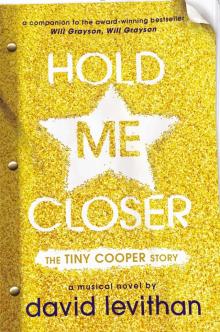 Hold Me Closer: The Tiny Cooper Story
Hold Me Closer: The Tiny Cooper Story The Full Spectrum
The Full Spectrum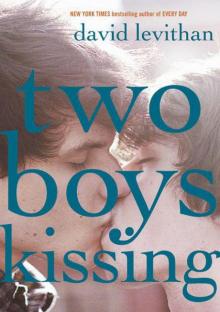 Two Boys Kissing
Two Boys Kissing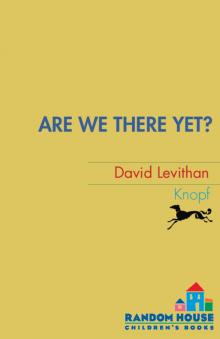 Are We There Yet?
Are We There Yet?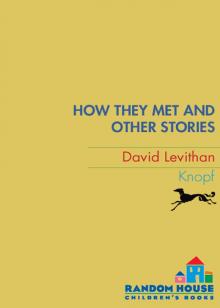 How They Met and Other Stories
How They Met and Other Stories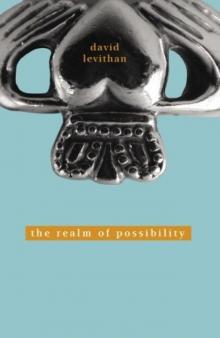 The Realm of Possibility
The Realm of Possibility Love Is the Higher Law
Love Is the Higher Law 19 Love Songs
19 Love Songs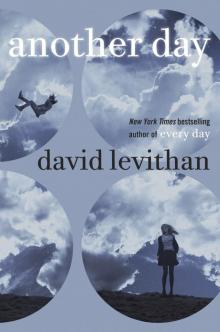 Another Day
Another Day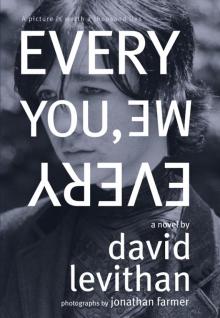 Every You, Every Me
Every You, Every Me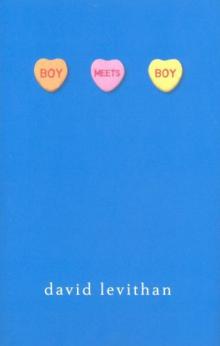 Boy Meets Boy
Boy Meets Boy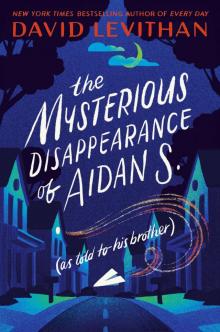 The Mysterious Disappearance of Aidan S. (as told to his brother)
The Mysterious Disappearance of Aidan S. (as told to his brother) 21 Proms
21 Proms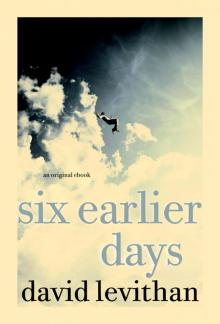 Six Earlier Days
Six Earlier Days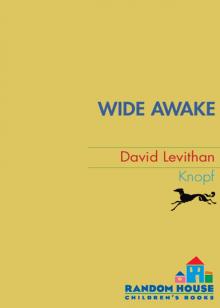 Wide Awake
Wide Awake Take Me With You When You Go
Take Me With You When You Go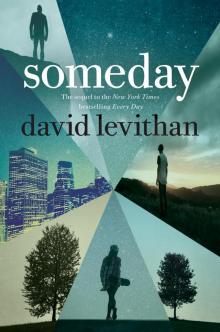 Someday
Someday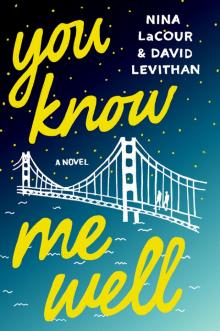 You Know Me Well
You Know Me Well Sam and Ilsa's Last Hurrah
Sam and Ilsa's Last Hurrah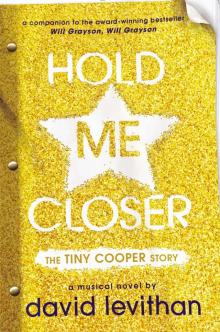 Hold Me Closer
Hold Me Closer Likely Story!
Likely Story!